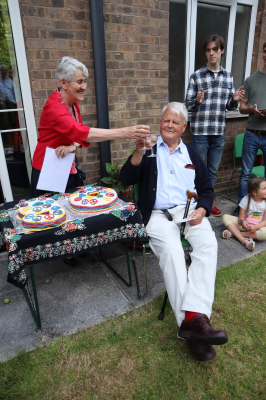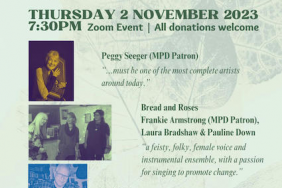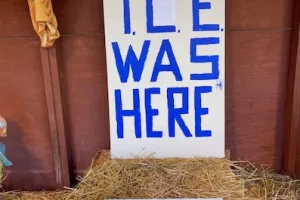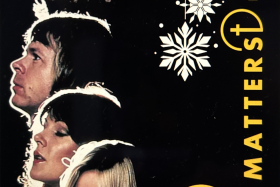Bruce Kent at 90 - "endless energy, creativity and dedication"

I have admired Bruce Kent for many, many years. There was his rousing speech at the million-strong march and rally in London against the Iraq War on 15 February 2003 which made me feel very proud there was a Catholic speaker there. "Wave your banners" he said, "what a beautiful sight you are" and the vast crowd in Hyde Park cheered. There was his public letter to Pope Francis in 2013 calling on him to "speak to the world about the elimination of war and all weapons of mass destruction". Bruce felt there had been "consistent Catholic opposition to nuclear weapons that goes back to Pope John's Pacem in Terris but which needs restating". That same year I worked with him to produce a DVD, Conflict and Climate Change, which made links between militarism and human-induced global warming. He has endless positive energy, creativity and dedication to peacebuilding.
Perhaps the most prominent Catholic peace activist in Britain, Bruce Kent has served in management of the Campaign for Nuclear Disarmament (CND), the International Peace Bureau, the Movement for the Abolition of War, as well as Pax Christi, the Catholic Movement for Peace. Now entering his nineties, he is still giving talks, nurturing peace initiatives and writing regularly in the Catholic press in Britain about peacemaking. He is currently vice president of both CND and Pax Christi UK. For most of his life Bruce has been London-based. His favourite quote from Catholic Social Teaching is from Pope Paul VI's 1967 encyclical Populorum Progressio: 'Peace is the fruit of anxious daily care to see that each person lives in justice as God intends'.
His compassion for people facing hardship or trouble, and victims of conflict, goes back to his youth. His mother was a strong influence with her Catholic faith, and she was also "very generous and outgoing". Whilst being educated at Stonyhurst College "where I became an orthodox, right wing young Catholic" he remembers making a fuss to the Jesuits about the situation of a cleaner who had a two mile walk to work and he thought they should provide transport. After a period of national service in the British Army, where he served in Northern Ireland, and reading law at Oxford University, he entered a seminary to train as a Catholic priest. The seminary encouraged outreach and he paid weekly visits to a TB sanatorium. "Being a Catholic was more than reciting prayers and saying Mass" he says.
In 1969 he visited Biafra during the Nigerian Civil War, and saw the victims of the embargo imposed there. He was "very impressed with the Irish missionaries" serving the people. He points out that one and a half million people starved to death and the blockade was made possible by British weapons. "Biafra taught me the importance of fighting injustice's causes - not just its symptoms" he says, and he has felt the same about the many wars since that time. To ignore the causes of injustice and war "is to short-change the poor of this world". He feels that war and militarism cannot be treated as separate issues by any aid agency dealing seriously with poverty. He has supported Campaign Against Arms Trade since the 1970s, and welcomed their recent legal victory highlighting the cost to civilian lives - particularly in Yemen - caused by British bombs and fighter jets sold to the Saudis.
Bruce was first introduced to the Catholic peace movement in the 1960s when he learnt about Pax Christi's international summer routes for young people. Then he met Archbishop Thomas Roberts SJ, who played a significant role in promoting recognition of conscientious objection to war, using the example of Franz Jägerstätter, an Austrian anti-Nazi farmer and also church sexton who was beheaded in 1943 for his refusal to serve in Hitler's army. People like Jägerstätter, Roberts argued, should know they have the clear support of Church teaching. He also took the view that nuclear weapons involve immoral actions: the destruction of innocent people and a willingness to perform such acts in given circumstances. Bruce had witnessed 'Ban the Bomb' demonstrations in London and developed an affinity with peace campaigners and conscientious objectors. It was a decade that saw him working for Cardinal John Heenan in Archbishop's House, being made a 'monsignor', and clearly being earmarked as a rising star in the Church. He heard remarks about damaging his career if he remained active with CND, but peacemaking had become his primary vocation.
In the 1970s Bruce was juggling chaplaincy work, parish work and peace commitments, including working in the CND office. He was inspired by the great encyclical Peace on Earth in 1963 and in 1971 by the "remarkable" document on the Church and Justice produced by the Bishops' Synod in Rome. Called Our World and You it focused on poverty, peace, education for justice and the Church's duty to practice what it preaches. In 1980 he became the General Secretary of CND, at a time when Britain announced it would be hosting American cruise missiles and building new Trident nuclear submarines with American missiles and British warheads. Membership of CND mushroomed throughout the 1980s. It saw Bruce - a gifted orator - speak at huge rallies, write articles, do interviews, debates, and visit local groups. He often returned on a late-night train from meetings round the country and rose to say early Mass in his parish before heading to the office for another hectic day. There was also a growth in heated attacks on himself and on CND. On 6 August 1986, for example, as he completed a long walk from the nuclear submarine base at Faslane in Scotland to Burghfield, the nuclear bomb factory in Berkshire, the minutes' silence for the dead of Hiroshima and all wars was drowned out by the loud music of opponents. The regard CND has for Bruce is shown by the short video interview that they put up as a 90th birthday tribute this weekend.
His greatest sadness has been that the Catholic Church "kept the peace movement at arm's length", although a CND survey in the early 1980s found that 25 percent of members were also Christians active in their churches. He is full of praise today for the late Bishop Victor Guazzelli, former President of Pax Christi, and Bishop Thomas McMahon of Brentwood who broke ranks to call for Britain to take first steps to de-escalate nuclear build up. Bruce praises Cardinal Basil Hume "who gave me generous support" despite mounting personal criticism of Bruce's role in CND by prominent Catholics. For Bruce, things came to a head with the prospect of a 1987 general election promising another bitter contest over the nuclear issue, and further personal attacks on his leadership role in CND.
He felt he was in an impossible position. "Many of my fellow Catholics, and other Christians, told me that what I was doing as a priest gave them hope", he says, "though I knew that most of my bishops did not think my work was priestly". In December 1986 he resigned from the priesthood to which he had belonged for 30 years, saying "I no longer find it possible to cope with the strain resulting from the tension between my pastoral role which means so much to me and what is thought to be an unacceptable political role". In the 30 years since that time Bruce has continued focusing on his peace activism. Since 1988 he has had his wife and fellow peace campaigner, Valerie Flessati, alongside him. And he is enthusiastically affirming of the women who have been inspirational in Pax Christi, such as Pat Gaffney and Marie Dennis.
What are today's challenges? Bruce is an outspoken opponent of the British Government planning to spend more than £200 million on building and maintaining another generation of nuclear weapons to replace Britain's current Trident system. This massive sum is, to use the phrase of President Eisenhower in 1953, 'a theft from those who hunger and are not fed'. Bruce feels it makes nonsense of any British commitment to rid ourselves and the world of nuclear weapons. "If you have these weapons, you intend to use them" he says, "and that is immoral". He cannot reconcile that if an individual threatens to attack or actually does attack a neighbour it is an illegal action, and yet nations - particularly powerful ones - often get away with it if they behave this way. I agree with him.
Bruce educates young people about citizenship and the work of the United Nations. "I go into schools of all sorts" he says, "and ignorance of the good work of United Nations and of its sub agencies, of the International Court of Justice, or the International Criminal Court is massive". He adds that, "it grieves me that the miracle which brought the UN to life in on 26 June 1945 remains so small a priority in the Church, and in public life generally".
Bruce is an admirer of Pope Francis, and is happy to support his work on any action related to peace, justice, equality and the global trusteeship of our world. "My heart has been lifted by the breath of fresh air which he has brought with him" says Bruce. He feels peace on Earth is going to depend on joined up education and campaigning on overcoming poverty, militarism and climate chaos, and Pope Francis understands these connections. "I believe in nonviolent solutions to problems" he says and is delighted that Pope Francis chose to focus on nonviolence as a political choice for his World Peace Day message for 1 January 2017 and has since then launched an international nonviolence initiative. In addition to his peacework, Bruce engages with refugees, visits prisoners and campaigns for prison reform. He encourages religious orders to support Justice, Peace and Ecology issues with finance and use of premises.
Bruce says: "I have always been a glass half full not half empty person and in terms of peace and social justice the Catholic glass is very much half full". He says it is amongst groups of visionary people such as Justice and Peace groups and Pax Christi "that I find my own sources of life and inspiration". He adds, "I am a comfortable member of my own parish but it is with its Justice and Peace Group that I am really at home and of one mind". Will he ever retire from Justice and Peace work? "I don't think so, it is a part of my faith".
In Bruce's 90th year he has attended and spoken at many peace events. The month of May alone saw him at the annual International Conscientious Objectors Day event in Tavistock Square, the protest outside Westminster Abbey's service to celebrate 50 years of Britain's nuclear weapons, the quarterly meeting of the National Justice and Peace Network, and Pax Christi's AGM, which he never fails to support. Here he was delighted to acknowledge the presence of two bishops, valuing links with a structural Church which remains very dear to his heart. Next weekend he will be attending the 'Save the Earth, Abolish War' conference, organised by the Movement for the Abolition of War, examining militarism and the environment. And these are just the events I know about! He is particularly sharp on how military activities contribute to climate change. Whenever he reads notes from the National Justice and Peace Environment Group meetings, he contacts immediately to gently remind about the links between militarism and environmental crises! But any challenges he presents are always done with graciousness and respect.
This weekend, family and friends - many of them in the peace movement - gathered at the Assumption Sisters' Milleret House in Kensington to celebrate Bruce's long life and his positive influence on them and on society. He looked far younger than his 90 years, and displayed his witty and engaging personality. A niece made a special cake decorated with CND symbols, which he greatly appreciated, and a second cake was decorated with 90 candles, which he had sufficient puff to blow out. All laughed and clapped when, in his review of his life, with Valerie at his side, he said that marrying Valerie was the best decision he ever made!
Happy 90th birthday to Bruce Kent!
WATCH
Tablet video - Interview with Bruce Kent during the 2019 Ash Wednesday Witness
www.youtube.com/watch?v=cWZkXCJA2Fo
Bruce Kent - 'Why I joined CND' - www.youtube.com/watch?v=eItowbXkL1Y


















